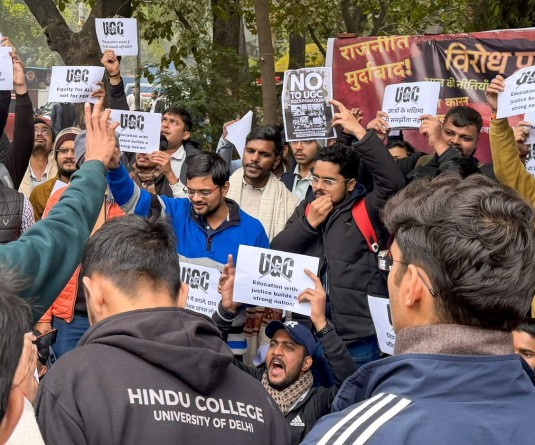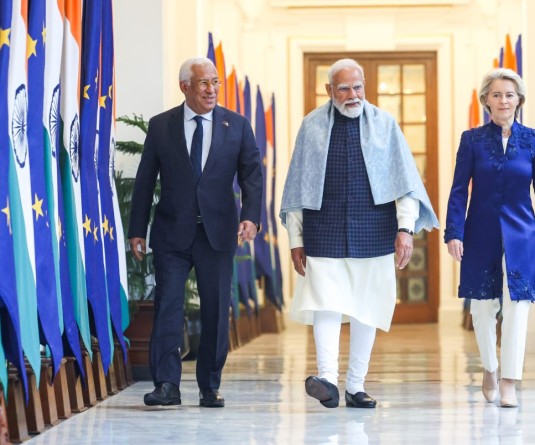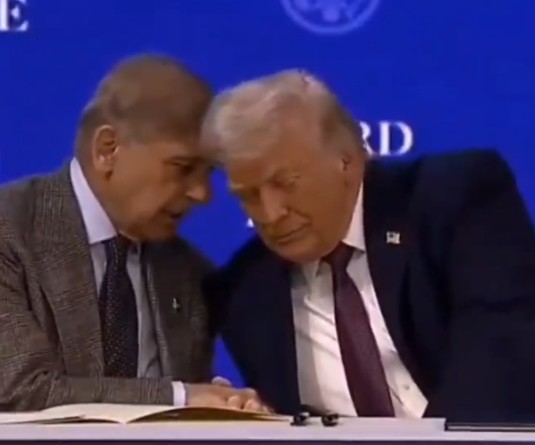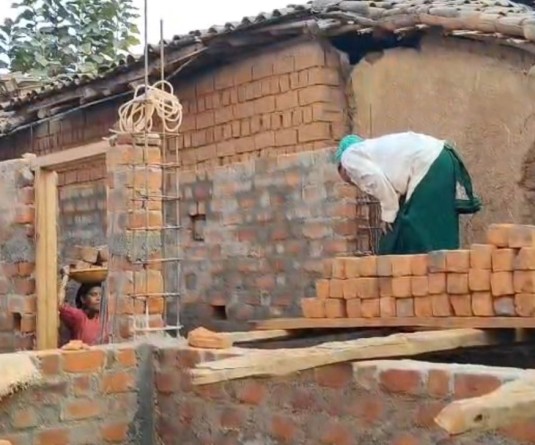Washington : Prime Minister Narendra Modi with US President Joe Biden during a press conference in the East Room of the White House in Washington, on Thursday, June 22, 2023. (Photo:IANS/Twitter)
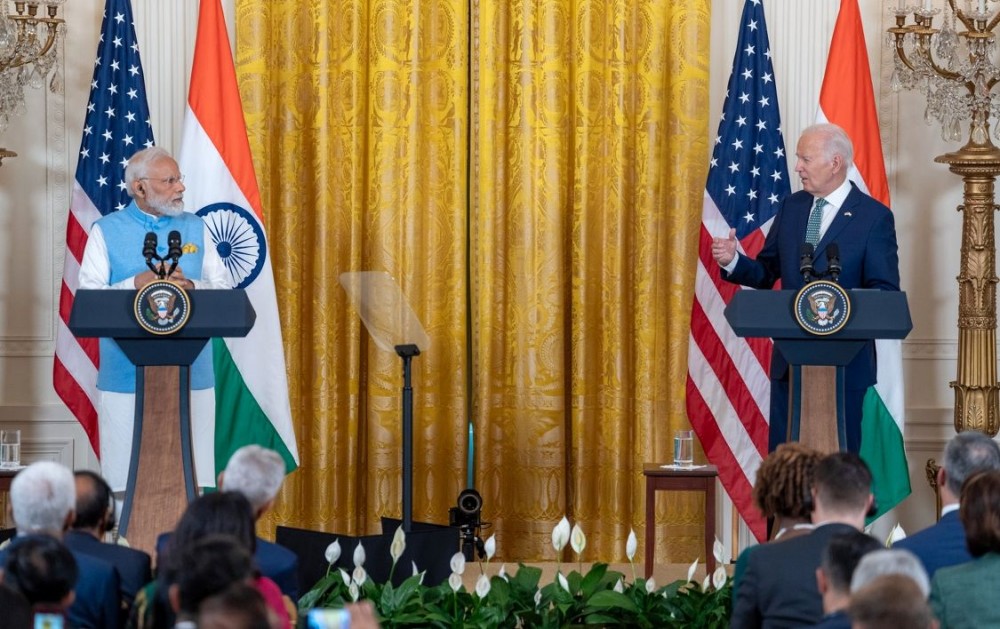
New Delhi, July 2 (IANS) The grand reception accorded to Prime Minister Narendra Modi in the US by President Joe Biden and First Lady Jill Biden on June 22 at the White House - to which a large number of US nationals of Indian origin were invited - demonstrated three new aspects of the US-India friendship.
These aspects are: the two largest democracies are set to lead the democratic world in facing both ‘challenges and opportunities’ in the times ahead, the Americans of Indian origin are bringing pride to both nations, and the Indo-US relationship now embraces all aspects of defence and security.
These are clearly the new benchmarks set to define what looks like an irreversible friendship between the two countries.
It is indeed remarkable that there are no conceivable negatives about this relationship notwithstanding India’s balanced approach to the Ukraine-Russia military conflict and a strong lobby in the US questioning the alleged erosion of freedom of expression in India under the Modi regime.
In their opening remarks, both Biden and Modi referred to the democratic base of the Constitution of the two countries rooted in the words ‘We the people’ and spoke of their shared commitment to world peace and advance of democratic values.
International relations in today’s geopolitics are determined by both security and economic concerns of the nations but the geo-strategic dimensions had the overriding importance - significantly the National Security Advisors of India and the US, Ajit Doval and Jake Sullivan, were the only other invitees to the private dinner and musical evening that President Biden hosted for the Indian Prime Minster at the White House on the first night of the visit itself.
Prime Minister Modi’s comprehensive, informative and powerful address at the US Congress was undoubtedly the best presentation of India’s progress in recent years, its civilisational strength and its vision of a peaceful ‘one world’. He called for a new world order- post-Covid- marked by a seamless Indo-US cooperation for economic growth, security and environmental sustainability.
His commitment to India’s national interests stood out as he marshalled the facts of India’s advance in digitalisation, the success of ‘direct transfers’ to the poor and the mutuality of gains that would result for both the countries from American investments in India.
Modi's emphasis on India speaking with ‘one voice’ despite its vast diversity in terms of language, customs and ways of worship was an effective counter to those who had been building a narrative of India’s internal ‘divisiveness’.
The Prime Minister pointed out that from being ‘a stranger’ in the area of defence cooperation, the US is now one of the largest defence collaborators for India.
On important geopolitical developments, the Prime Minister was characteristically upfront as he forcefully upheld the right of all stakeholders to demand ‘an open rules-based order’ in the Indo-Pacific and oppose any aggression and encroachment there, reiterated in the context of Ukraine-Russia military confrontation, that ‘this was not the era of war’ and called for peaceful negations to end the ‘human misery’ resulting from the conflict and made strong advocacy for full membership for African Union in the G20.
He was clearly advising President Putin to heed the call for peace negotiations with Ukraine under the UN charter but he did that without joining in the criticism of Russia for its military intervention in that country.
On China, Prime Minister Modi said that dark clouds of ‘coercion and confrontation’ were looming large over the Indo-Pacific and left no one in doubt that India was fully committed to Quad for protecting the freedom of the region. All of this secured a complete convergence of the stand of the US and India against China as the common adversary - India’s unlimited cooperation with the US in areas across the spectrum - from space to ocean - gives a message to China that any aggression in the Indian Ocean would be effectively put down.
What was implicit in India’s approach to Russia - and this seems to have been grasped by the US-led West finally - was that nothing should be done to irreversibly push Putin into the Chinese camp as this would not be in the strategic interest of either the US or India.
Prime Minister Modi put the development agenda on top by highlighting the need for rebuilding supply chains disrupted by Covid and the Ukraine-Russia conflict and demonstrated his political will in solving problems without giving in to challenges.
He used the occasion successfully to project India as the leader of the Global South and hence a world power in its own right. He spoke in English and spoke with his heart and his address was full of alliterations therefore, made a huge impact.
It speaks of the strategic comprehension of Prime Minister Modi and his National Security Advisor that the Prime Minister used the address at the Congress to warn the world that Terrorism in whatever form should be condemned without ‘ifs and buts’ as it remained a prime threat to world security. He was in a way referring to the trap of ‘good terrorists and bad terrorists’ the American administration had once fallen into while dealing with Pakistan. Without naming Pakistan, Prime Minister Modi specifically wanted action to be taken against countries harbouring and exporting terrorism.
The danger of terrorism is particularly live for India ever since Pakistan was successful in reinstalling the Taliban Emirate in Kabul in 2021 and the Sino-Pak axis was able to reach a give-and-take with the Taliban on Afghanistan enabling China to extend its Belt and Road Initiative (BRI) to that country.
Collaboration between Pakistan and China has become deeper after India abrogated Art 370 relating to Kashmir in August 2019 - the two hostile neighbours of India are stepping up covert operations to destabilise India internally and Chinese drones are now being used by Pak ISI to drop arms and drug consignments in the border states of Kashmir and Punjab.
The threat of radicalisation translating into the raising of Mujahideen - including suicide bombers - cannot be treated lightly as a desperate Pakistan is left only with the option of creating trouble for India.
Pakistan is now able to use militant groups across the Islamic spectrum - including not only HuM, LeT and Jaishe Mohammad but also those linked to the radical stream of Taliban, Al Qaeda and ISIS, in the proxy war against India. The precedence of how SIMI an off-spring of Jamaat-e-Islami Hind, gave rise to Indian Mujahideen (IM) is a good illustration of how faith-based terror could be churned out of communal militancy.
This US visit of Prime Minister Modi has proved to be of immense importance for the build-up it has given to the vision that in today’s conflict-ridden geopolitics, the forces of democracy can prevail over the undemocratic regimes and create a peaceful and prosperous world - the degree of unity demonstrated by the two largest democracies of the world gave credence to this global thought.
India and the US certainly looked like ‘equal’ partners in this mission and this perhaps would be the strongest point of this visit - the credit for pushing India up to this special status, squarely going to Prime Minister Modi.
The fact that under the Modi regime Indian economy rose to fifth position from the earlier tenth and that it is on its way to becoming the third largest in the quickest time is a tribute to the Prime Minister’s initiatives and strong governance.
The visit also marks a crowning glory for India’s handling of international relations and this would surely enhance the political standing of Prime Minister Modi at home. If the economic development of India leads to the betterment of the average Indian, the Modi regime would gain electorally too.
In India, the opposition is feeling squeezed because of the popular support enjoyed by Prime Minister Modi over and above the party's influence. The narrative of the Modi government promoting majoritarianism and authoritarianism and not giving protection to the minorities has not caught up and in a rare interaction with media in Washington, Prime Minister affirmed that there was no discrimination in India on the basis of caste, creed and region and that he believed in ‘sabka saath, sabka vikas and sabka vishwas’ thus placing his government’s policy of putting all citizens on the same footing, on record.
Addressing a huge gathering of Indian ex-pats at Reagan Centre on the last day of his US visit, Prime Minister Modi declared that the ‘new journey’ started by India with the US will ‘reshape the world’ and expressed confidence that the big investments from the US will give a boost to job creation and innovation in India.
He emphasised that the multiple tech-linked accords with the US would help India break new ground.
Prime Minister must be complimented for thinking big as far as India’s economic growth was concerned and presenting India as a proud nation willing to partner with the US on global advancement and peace.
The messaging is timely and appropriate and in the months and years ahead, India should hope to create jobs and opportunities on a scale that should effectively tackle the problems of unemployment and poverty.
It would be unfair to suggest that Prime Minister Modi remained engaged with the world outside and did not think enough of solving these domestic issues. This visit to the US was as much about geopolitical strategies as it was for taking India to a new high in terms of economic growth and the welfare of the people.
The joint statement issued at the end of Prime Minister Modi’s epoch-making visit to the US specifically touched on different spheres of Indo-US cooperation in the future.
Prime Minister Modi and President Biden acknowledged that the statement represented the most expansive and comprehensive vision for progress ‘in the history of our bilateral relationship’.
The statement, among other things, covered the growing bilateral education partnership, active collaboration across the full expanse of health sectors and further action to facilitate the movement of professional and skilled workers, students, investors and business travellers.
It announced that India and the US would take specific steps towards developing bilateral cooperation for strengthening economic relationships including trade ties. The two leaders reaffirmed that the Indo-Pacific Economic Framework (IPEF) is an important pillar of collective efforts to build resilience in supply chains, clean energy, effective tax administration and capacity-building measures.
Apart from propelling global growth, the two countries detailed the measures required for a deepening strategic convergence. President Biden welcomed Prime Minister Modi’s Lifestyle for Environment initiative(LiFE) as a successful national model and resolved to work together with him to implement the G20 High-Level Principles on Lifestyles for Sustainable Development. This is a huge compliment to the Prime Minister’s vision of translating lifestyle contributions to the amelioration of global issues of climate change, land degradation and biodiversity loss.
The two leaders expressed deep concern over the conflict in Ukraine, mourned the tragic human situation created by it and called for greater efforts to mitigate the consequences of the war in the developing world in particular. They called for respect for international law, principles of the UN charter and territorial integrity and sovereignty. They even mentioned post-conflict reconstruction of Ukraine - an idea first mooted by India.
The statement significantly did not mention Russia and this in a way legitimised India’s stand on the conflict. The US and India held that multilateral systems reflected contemporary realities better and recommitted themselves to empowering Quad as a partnership for the global good.
The statement made out that the Quad to be hosted in India in 2024, would be an opportunity for consolidating cooperation for an open and secure Indo- Pacific by working in partnership with regional platforms like the Indian Ocean Rim Association, Indo-Pacific Oceans Initiative and ASEAN.
India has thus built a geopolitical counter to deal with any Chinese aggressiveness off the Indian Ocean through a partnership with the US.
The US visit has given a transformational lift to India as a world player in both global growth and security.
The most important part of the joint statement from the point of view of India’s strategic and national security concerns is the clear denunciation of global terrorism and violent extremism in all its forms and manifestations, by both US and India. Demanding concerted action against all UN-listed terror groups including Al Qaeda, ISIS, LeT, JeM and Hizbul Mujahideen, the two leaders condemned cross-border terrorism and called on Pakistan to take immediate action to ensure that no territory under its control was used for launching terror action.
President Biden joined the Indian Prime Minister in demanding strong action against those behind 26/11 and the attack on the Pathankot airbase in January 2016.
Biden administration has finally discovered the true character of the ‘Deep State’ in Pakistan and got over notions of ‘good terrorists vs bad terrorists’ it once harboured to draw a line between Islamic radicals who attacked the US-led West and the India-specific terror outfits controlled by Pak ISI that made no hostile move against the US.
American administration also realised that Pakistan pretended to be a mediator in talks at Doha only with the intention of getting the Taliban Emirate reinstalled in Kabul just like what it had done in 1996 in the years following the withdrawal of the Soviet army from Afghanistan.
The visit has effectively highlighted the threat posed by the Sino-Pak axis to the entire democratic world. While diplomacy continues to contribute to the evolution of foreign policy, today’s uncertain geopolitics has made the role of India’s National Security Advisor particularly important as a prime determinant of international relations.
The visit of Prime Minister Modi to the US has proved this - the stand clearly shared by him with President Biden on the threat of Islamic radicalisation was extremely important. Prime Minister Modi’s visit to Egypt on his return has met a strategic requirement of India in dealing with this threat.
Egypt still carrying the legacy of the Shiite Fatimid empire practices moderate Islam of the kind that had facilitated the advent of Sufism. Egypt, Saudi Arabia and UAE with their new equation with Israel in I2U2, are the nodal points in the Muslim world that Prime Minister Modi on the advice of the NSA is tackling to the great advantage of India.


